

Explainer
Why are Aboriginal women in Australia hit with racism and sexual threats for sharing their views?
What do Lidia Thorpe, Jacinta Price and Tarneen Onus-Williams have in common? They've been the target of racial and sexual taunts for speaking their minds.
Published
Updated
Attacked for speaking out
It was the deafening banging on the front door of Victorian Greens MP Lidia Thorpe’s electorate office, in Melbourne’s inner-north, that first raised the alarm.
Luckily the door was locked, but it didn’t stop an unidentified man from getting his message across.
“All Abos must die,” the note he slipped under the door read.
The incident was the latest in a string of graphic sexual violence and death threats Ms Thorpe received after calling for Australian flags to be flown at half-mast on January 26.
“I wasn’t shocked. I was more disturbed a little, I think, by the level of degree that they went to,” Ms Thorpe tells NITV News.
As a Gunnai-Gundtjimara woman, Lidia has grown up surrounded by women who've dedicated their lives to the Aboriginal cause; women with fire in their bellies.
As a result she's become accustomed to being attacked for voicing her opinion.
“I’ve grown up in an environment where speaking out about Aboriginal people and our rights, [and] calling for land rights ... has always meant that we’re attacked,” she says.
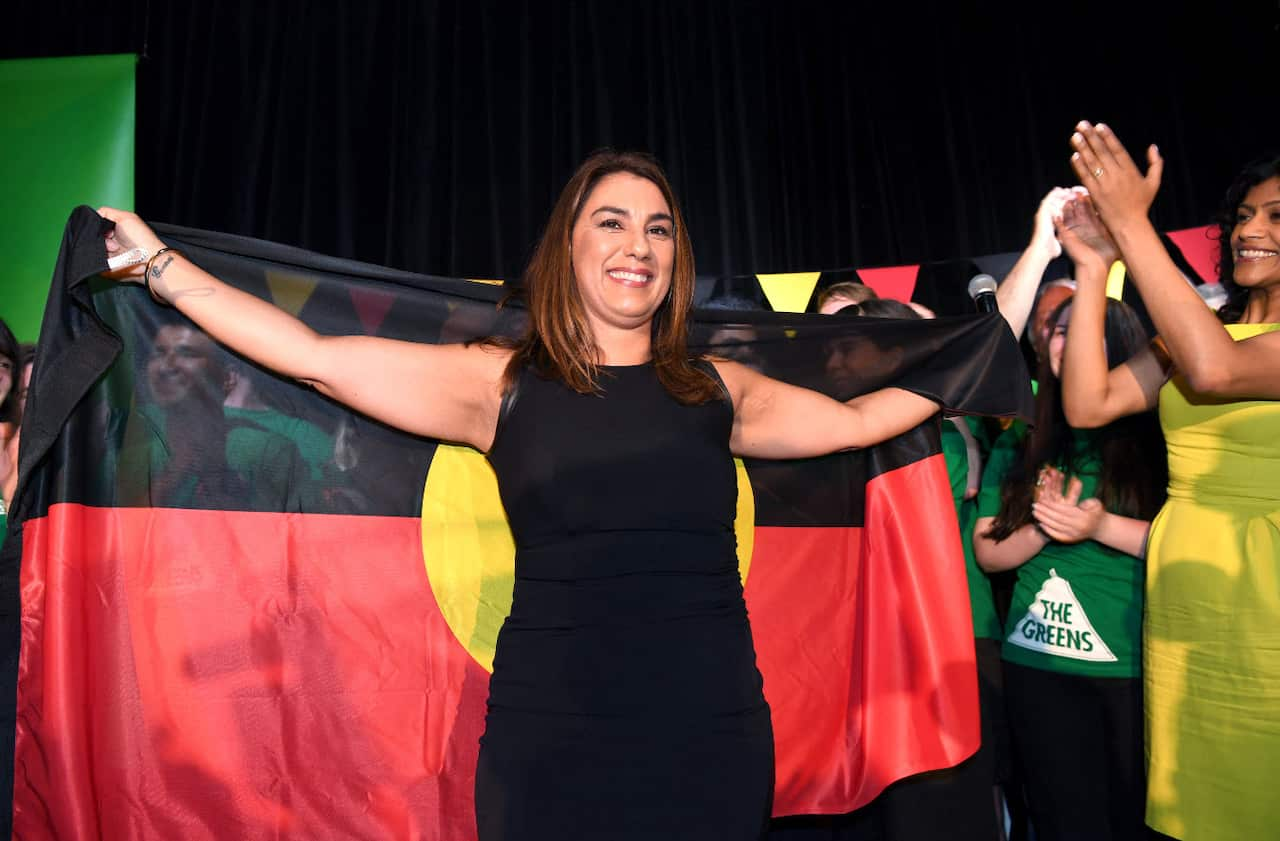
But this time it was different.
“To threaten me by using quite detailed gang rape threats… that was the part that I wasn’t used to.”
Ms Thorpe, the first Aboriginal woman elected to the Victorian parliament, was shaken by the level of violence in the threats.
“My staff called the police because the threat at the door was quite a serious one. Parliamentary Services also had the police involved due to the emails that came through to my parliamentary email, and so the local police increased the security around my office and around my personal address, so they would regularly do drive-bys to ensure that their presence was known,” she says.
“It has heightened my sense of security in terms of I have to be aware of my surroundings. But I think we do that unconsciously as women anyway."
For 24-year-old Aboriginal activist, Tarneen Onus-Williams, going to the police is not an option she tells NITV News.
“I think I’m safer with my dad and my family being my security guards than the actual police."
“I’ve gone to the police before for a sexual assault, almost two years ago now. In my case, they kept bringing up things about Invasion Day, and the person ended up getting off,” she says.
Ms Onus-Williams is no stranger to being on the receiving end of abuse for speaking her mind, but it was after her speech during an Invasion Day rally in Melbourne last month where she said, ‘F**k Australia! Hope it burns to the ground!’ that Tarneen felt the full brunt of that abuse. Despite arguing her words were to be taken "metaphorically", rather than literally, Ms Onus-Williams has been at the centre of a wild media storm. High profile commentators and mainstream media outlets have condemned her publicly, others have taken to social media to defend her, sparking the #IStandwithTarneen campaign which trended on Twitter.
Ms Onus-Williams told NITV News the experience has left her distraught.
“Someone wrote [to me], 'there is nothing better than hate-f**king someone', that was probably one of the worst ones because that is so disgusting,” she reveals.
Even during our interview, she received another insult.
“Just now, someone has called me a 'parasite'," she reads from her Twitter account.
"Calling someone an animal or referring to them as such a bug means that their life is disposable. For me, it’s like a mandate for murder.”
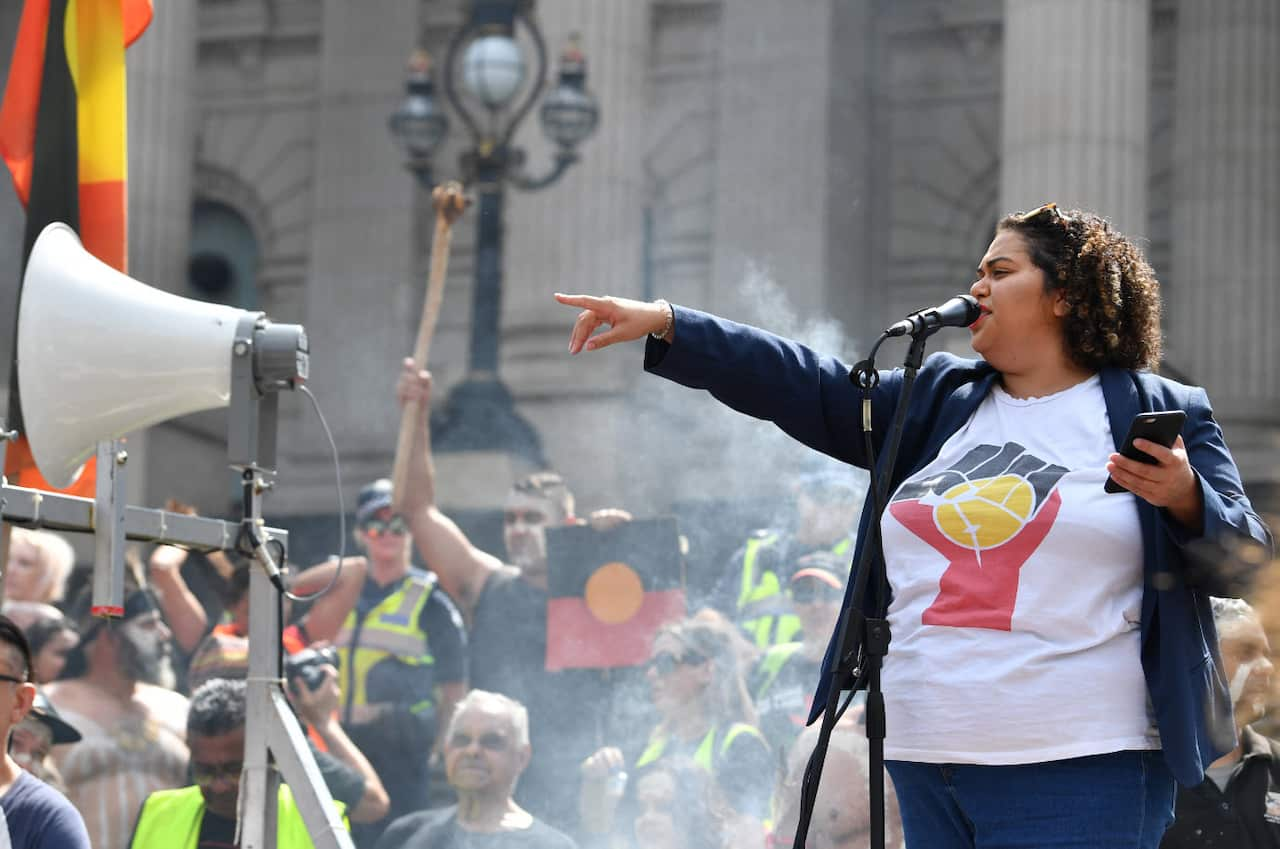
It's been a difficult few weeks for Ms Onus-Williams.
"I felt very isolated and that I’d done the wrong thing, and I’d done this to my community," she says.
The reaction to her comments has been stinging. Almost every publication around the nation has reported on the speech and conservative politicians pounced on the headline grabbing opportunity.
Former Victorian Liberal Premier Jeff Kennett was one of the first, saying “those who use inappropriate language against the country they choose to live in, use language like that because they don’t have the intellectual capacity to argue their case.”
“If they don’t like it, if they think the country is as bad as so many of their banners indicate, they have the opportunity to buy a one-way plane ticket,” he said.
Victorian opposition leader Matthew Guy labelled her comments as “a disgrace”. The Daily Telegraph went as far as body-shaming her by saying, 'Tarneen wants Australia to burn, but probably not all the pie shops'. The Herald Sun called out Ms Onus-Williams for failing to talk about “welfare issues in Indigenous communities, including domestic abuse, alcoholism and murders.”
But she says the Invasion Day rally is to do just that — to protest against the treatment of Aboriginal people.
"When we have Black Deaths in Custody protests, no-one turns up. When we have a Don Dale rally, yeah, there are a few people that turn up but not that many. People say, 'why aren’t you protesting this and this?', telling me how do to do my activism. We do those things, but you choose not to listen, you choose not to show up. Don’t tell me how to do my activism as an Aboriginal woman."
Lidia Thorpe agrees black women need a safe platform.
"Let this country hear both sides of the story. Let’s have those women that have been affected by this, let them speak up," she says.
Alice Springs Councillor Jacinta Price is another Indigenous woman who has experienced hate and rage for voicing her opinions.
After joining former Labor leader Mark Latham's campaign to 'Save Australia Day,' saying changing the date is 'shallow,' 'meaningless,' and only 'fuels hate', such statements have seen the Walpiri woman embraced by many conservative commentators.
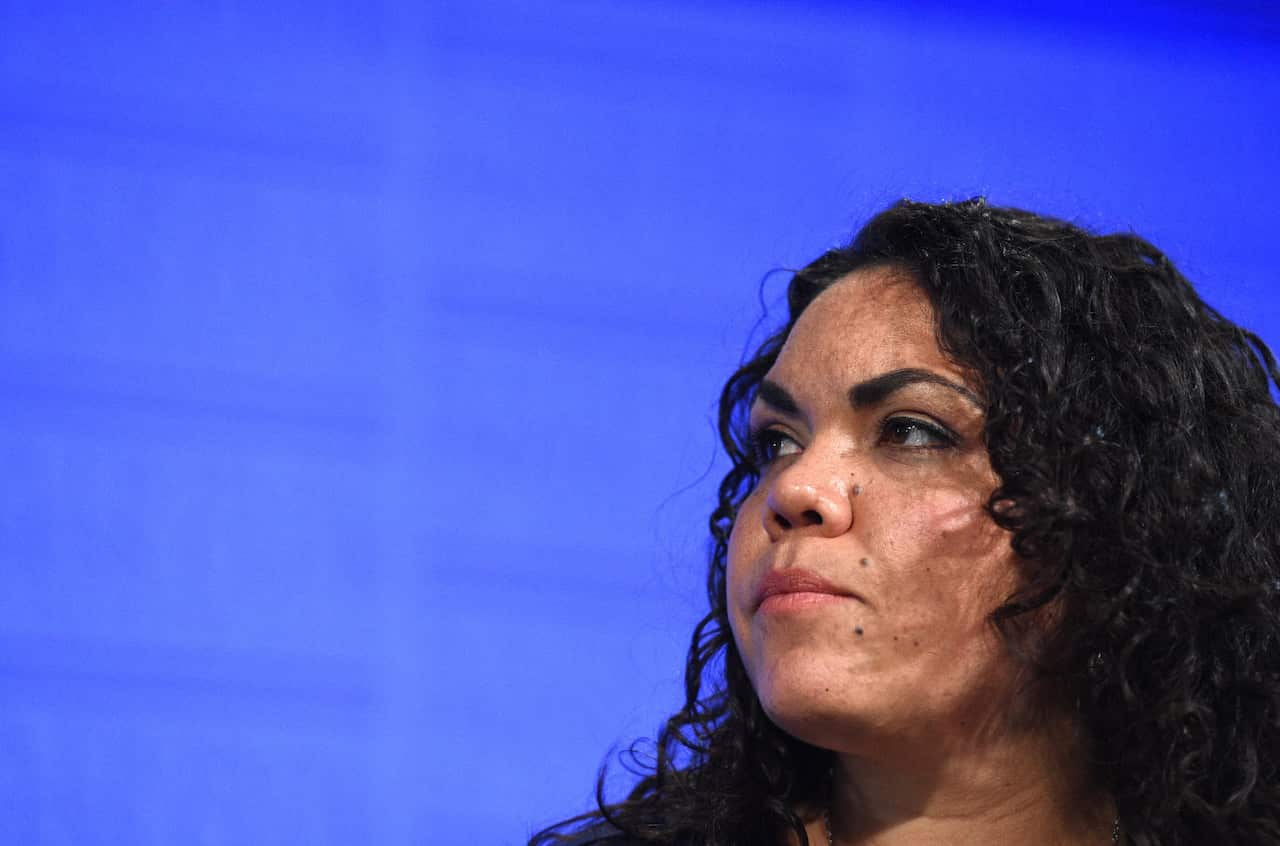
She's become a regular on former Abbott advisor Peta Credlin's Sky News program, she's addressed the National Press Club, and appeared on Alan Jones' 2GB and the Bolt Report.
But Ms Price's controversial views have left many in the Indigenous community up in arms. More than 6500 people have signed a petition stating Ms Price and her mother Bess, a former NT politician, 'do not represent' them or speak on their behalf.
But Ms Price maintains: "I’m not trying to be a spokesperson for all Aboriginal people."
"The media have pushed this narrative that there’s only one Indigenous viewpoint for so long, that when someone like me comes along and says something that’s different, suddenly I’m turning against my own people," she told NITV News.
Consequently, her perspective on how to address issues in the community has meant she has become the subject of public vitriol.
"I’ve had moments when it’s really hurt me," she says.
She says some of the worst abuse has involved threats to rape and kill her.
"It makes me feel disgusting, like you know, if someone can send that to you, are they abusers themselves? Have they perpetrated sexual violence against another person?".
"[Aboriginal women are] utterly vilified in the most horrendous way and you wouldn’t even think that you know, a rapist or a murderer would be abused in such a way, in the way that we get abused.”
While much of the opposition has come from within her own community, there's no doubt she too has become the target of abuse, some of which may be even deemed punishable by law, under the Racial Discrimination Act or the Criminal Code.
All three women, while they have opposing views, share some similarities.
They're black, female and outspoken. They've all been persecuted for speaking out and fear not just for their safety, but that of their families and children.
'We're seen as less than'
Why are black women in Australia shot down for voicing their opinion?
Tarneen Onus-Williams says it's because 'black women's lives are more disposable.'
"Because Aboriginal women’s bodies are [seen as] 'less than', we are much more 'rapeable', in the sense that our bodies mean less and our consent means less," she says. "Because we are dehumanised and we’re seen as less than, its easier to perpetrate violence against us."
Lidia Thorpe says Aboriginal people are considered as 'lesser' in many different aspects.
"It’s seen in the education space, it’s seen in the private rental space, it’s seen in a range of areas. We’re people to be wary of," she explains.
"You only need to look at my social media and my private inbox to see what people think of Aboriginal people. It’s quite disgusting. It’s quite alarming to see the volume of racism coming through," she says.
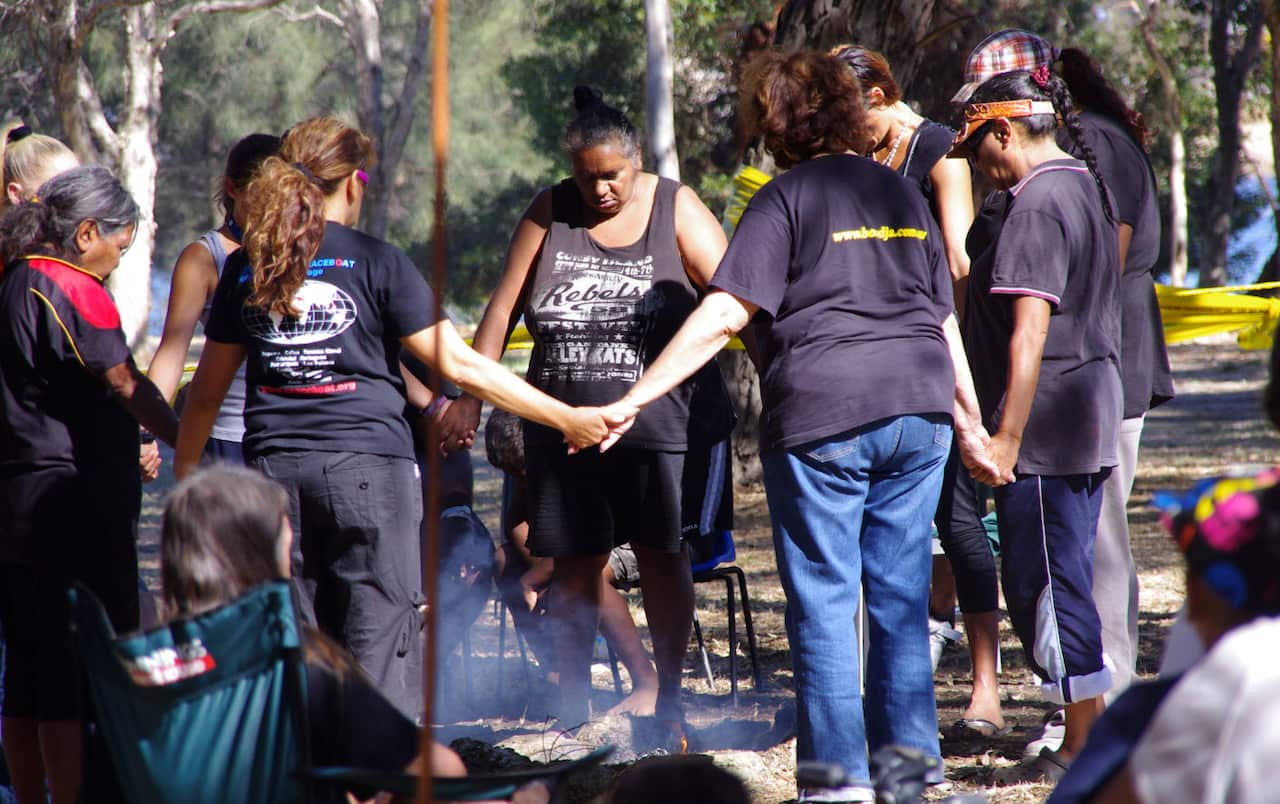
Dr Chelsea Bond, a senior lecturer at the University of Queensland, says black women 'don't come to the mic from the same position as a white man.'
"Even as an academic, it doesn’t matter how smart we are, how much power we get, the power of race and gender — that stuff can be dismissed," she tells NITV News.
Dr Bond, a Munanjahli and South Sea Islander woman, says the silencing of black women is just society falling back to 'default mode.'
"In the lead up to Invasion Day, all the commentators were white men and women, and some Aboriginal men. For the most part, [Aboriginal women] were silenced, [we] have to fight to even get to the mic, or when we do it gets shut down because people are not used to it," she says.
In her article, The Audacity of Anger, Dr Bond explains, 'the tone-policing of black women functions to maintain their position on the ladder, ensuring that we don’t get ahead of ourselves or them.'
"Black women aren’t allowed to speak, 'how dare you speak?', [it's] putting us back in our place," she says.
Ms Onus-Williams says it comes down to sexism and misogyny.
“People don’t want to listen to an Aboriginal person in general, then [why] an Aboriginal woman? When the two intersect, they just don’t want to because we’re seen as 'less than',” she adds.
"Even conservative people like Marcia Langton, they get attacked with death threats all the time, why isn’t this happening to Warren Mundine?"
Upon hearing Ms Onus-Williams' comments on Australia Day, Mr Mundine, a prominent Indigenous businessman and former adviser to the Prime Minister on Indigenous Affairs, called for her to get fired. The former ALP president went as far as rousing political leaders to defund the state-funded Koorie Youth Council, where Ms Onus-Williams is a volunteer.
Mr Mundine labelled her comments, and those of youth collective WAR [Warriors of the Aboriginal Resistance], an insult to all Australians.
"I support moving Australia Day to 1 January. But this lot says 'we don't want to celebrate Australia Day at all.' They're ashamed of Australia," he lamented.
But Mr Mundine faced criticism of his own.
Academic Marcia Langton said Mr Mundine's attack on the Koorie Youth Council 'crossed a line,' and then his claims to 'support free speech' was 'abuse' and 'lies.'
"This is how it works. Scream for week to have the Koorie Youth Council de-funded so that Koori youth don't have a voice, then he claims to support free speech. Abuse, lies, opens every wound. Really, please shut up," Ms Langton wrote on Twitter.
Even Jacinta Price says while she knows Mr Mundine "gets hate", she doesn't see many other male Aboriginal leaders "or those who are vocal in our community, getting this level of vitriol thrown at them".
In fact, Ms Price says Indigenous women are usually used as scapegoats and seen as 'crazy' or 'mad' when they speak out.
"I have an Aunty who was sexually abused as a kid and she experienced incredible trauma and now, in her later years of her life, she stands up and she just will tell men exactly what she’s thinking and feeling. Other Aboriginal people in her family go, ‘ah, she’s mad that one, she’s mad’," she explains.
"They point blame, they victim blame as opposed to actually go, ‘well, what happened to her, in her life for her to become this woman that she is?’ No one’s been there for her and supported her through this trauma, and I think so many Aboriginal women experience that," she says.
Ms Onus-Williams says we see victim-blaming tactics all too often.
"We see it all the time, like ‘oh well if you didn’t say what you said, none of this would’ve happened to you’. It's kind of the same when women are told, 'if you didn’t wear what you wore, then none of this would’ve happened, or if you weren’t drunk then none of this would’ve happened to you'. It's always blaming the victim for what’s happened, instead of people actually taking ownership of their own behaviour," she says.
Dr Chelsea Bond believes many black women feel betrayed and constantly let down.
"There are white women who don’t speak up, and when our brothers don’t speak up, we're copping it both ways – how are they backing us up?" she questions.
"Three women lead the 60,000-strong Invasion Day crowd in Melbourne, to silence her [Ms Onus-Williams] and call for the Koorie Youth Council to be de-funded is unbelievable from 'a black leader'," Dr Bond says.
"Black women put their bodies on [the] line, for our kids and men when they came for Indigenous dads, it was black women who lead #IndigenousDads. It's always black women speaking out, leading the way."
Ms Onus-Williams agrees. She believes men are always seen as 'the strong and powerful ones', but it is the Aboriginal women who "have been leading the fight for years now, and our work isn’t recognised".
"How many people know that [it was] four Aboriginal women organised 60,000 people into Melbourne, where’s their praise?"
For her part, Jacinta Price says the feminist movement has only benefitted white women.
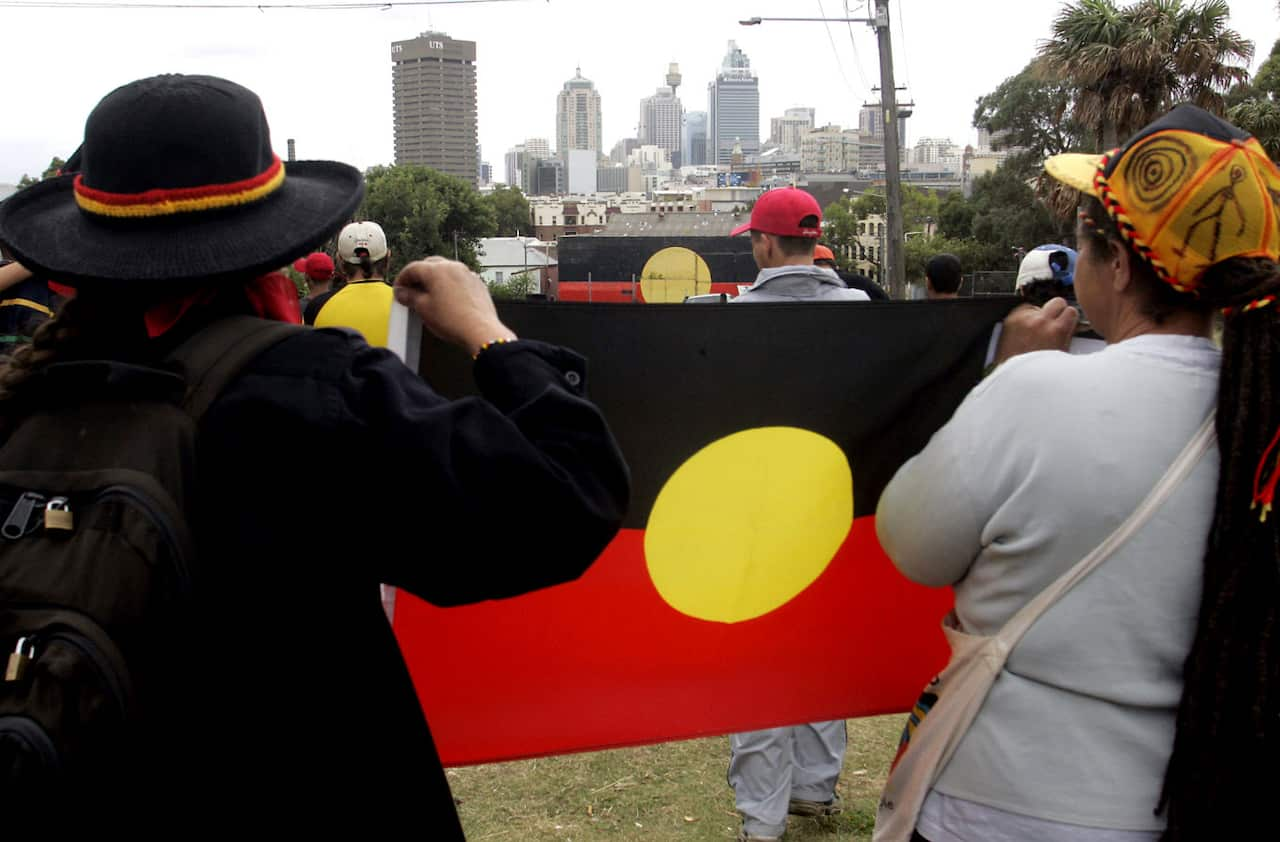
"They take a hands-off approach when it comes to the rights of Aboriginal women or Muslim women and we’re left to kind of fend for ourselves," she says.
Lidia Thorpe says its time black women get properly recognised.
"[We are] strong, resilient women who have gone through a lifetime of and come from a culture that’s endured all of these injustices for so long in this country," she says.
"We need to be heard. We want a platform like any other woman out there speaking out for injustices, family violence and incarceration.
"At the moment, as soon as we get up and speak, we’re the first ones to be shot down."
A history of being silenced
But the oppression facing Aboriginal women isn’t new. However, it isn’t that old either.
In her paper, "Women's Work: The Inclusion of the Voice of Aboriginal Women," Law Professor Larissa Behrendt tells of the historical role Aboriginal women played in society.
"Aboriginal women were not in a subordinate position to men," she wrote.
"Aboriginal women had their own culture and customs that men were not privy to. Female Elders could be as powerful as male Elders in their community. Most societies, including my own group, were matrilineal.”
But post-colonisation, society has been saturated with "the dominant' culture's most repugnant values in our community – sexism," Professor Behrendt believes.
"This dynamic has changed the social position of Aboriginal women within Australia. From being considered equal to men, we now occupy the lowest rung on the socio-economic ladder."
Professor Behrendt is not alone in establishing a direct correlation between colonisation and the demise of Aboriginal women and girls, which in turn affects other essential societal functions and perceptions.
The Final Report of the Royal Commission into Institutional Responses to Child Sexual Abuse, handed down on 15 December 2017, addressed questions developed by the commission and advisory group, about the risks Aboriginal and Torres Strait Islander children faced within institutions.
It's findings were correlated with data from previous reports and inquiries, such as the ‘Bringing them Home’, ‘Lost Innocents’, ‘Forgotten Australians’ and ‘Listen to Children’, amongst other resources and investigations.
The report dedicates many pages to compiling the harrowing history of the overt sexualisation of Aboriginal and Torres Strait Islander women and children, who often experienced sexual assault by white men, in communities, pastoral lands, and later faced heightened vulnerability when placed in missions and residential institutions, where they were overrepresented.
The report also dives into how historical discriminatory social attitudes worsened the sexual abuse risks experienced by Indigenous people, as a lack of condemnation allowed the mistreatment to thrive in the past.
“The dismissal of serious allegations of violence ‘sanctioned the sexual abuse of Aboriginal and Torres Strait Islander women and girls’ and therefore allowed abuse to continue unchecked’,” the report reads.
Jacinta Price has often pointed this out.
"Why is this allowed to happen in the Aboriginal society but we don’t allow that to happen in the Western society? You know, the Harvey Weinstein’s of the world are called out, but for us it’s silence."
Ms Price says victims of violence often remain silent to maintain the peace.
"The victim would often be blamed and I think this is what has carried on now and it’s something we have to have a look at and to address, to really end victim blame. And you’ll find that even there are women who will stand up for the perpetrators before they support a victim of violence or sexual abuse," she says.
Wiradjuri woman Suzanne Ingram says, in modern times, Aboriginal women have also been silenced under the culture of Aboriginal unity.
In a paper, 'Silent Drivers/Driving Silence — Aboriginal Women’s Voices on Domestic Violence,' Ms Ingram argues that while “Aboriginal women have long been vocal in the collective call for social justice”, they had been silenced “to such an extent that we now tolerate a rate of violence in our homes and communities that is drastically out of proportion with every other section of Australian society.”
She points out the Australian Institute of Health and Welfare statistics which shows hospitalisations from “intimate partner violence” for Aboriginal women can be 38 times higher than non-Indigenous women.
Ms Ingram puts the reluctance by white feminists to draw attention to the issue coupled with a male-led social justice agenda as the two major factors to the silencing of Aboriginal women's voices.
“We need allies. There are women who absolutely understand this, but there’s also the element who just say, ‘I’m not racist and I’m going to prove it and I’ll go along with what the (acceptable) rhetoric is’,” she told Fairfax media.
‘Aboriginal women have done all of these amazing things in this country’, yet their names aren’t in the history books
For Ms-Onus Williams, the lack of recognition is close to home.
Her grandmother, Sandra Onus, and Christina Saunders (formerly Frankland) launched legal action in 1980 in the Victorian Supreme Court to prevent Alcoa of Australia Ltd, one of the largest integrated bauxite mining and alumina refineries in regional Australia, from 'damaging or interfering with Gunditjmara cultural sites.'
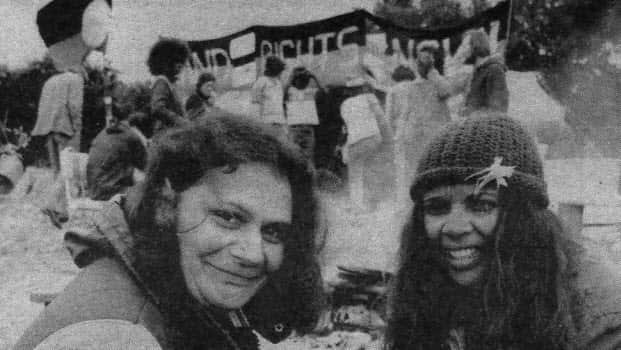
"No-one really supported them," she says.
“They, Nan and Aunty Tina Saunders, won at the High Court against Alcoa. They actually had to change the laws because it meant Aboriginal people had a connection to country – so they could have a standing in court.”
Their successful recognition of rights as Traditional Owners came more than a decade before the High Court Mabo native title decision.
"Eddie Mabo went ten years later, he won the High Court, but it wasn’t about connection to country. His work should be celebrated, but what about my grandmother?” she asks.
"Aboriginal women don’t get their story in history; they don’t get their names written in history.”
'This is not going to shut me down'
The last few weeks for Tarneen Onus-Williams have been overwhelming. She has even wondered if her comments dented the Aboriginal rights movement.
"Have I actually ruined this for the Aboriginal cause? There was definitely a lot of self-doubt," she says.
"I was really anxious about how this white supremacist society that we live in, how that is actually gonna treat Aboriginal people in my community."
“The media try to make you think that you’ve done the wrong thing. I was starting to believe I’d done the wrong thing, this is my fault," she says.
But despite the public vilification and unsettling thoughts - she won't take back her words.
“Things like that are said all the time at rallies, it just the media took that bit,” she says. “I didn’t mean it literally. I don’t regret what I said at all.”
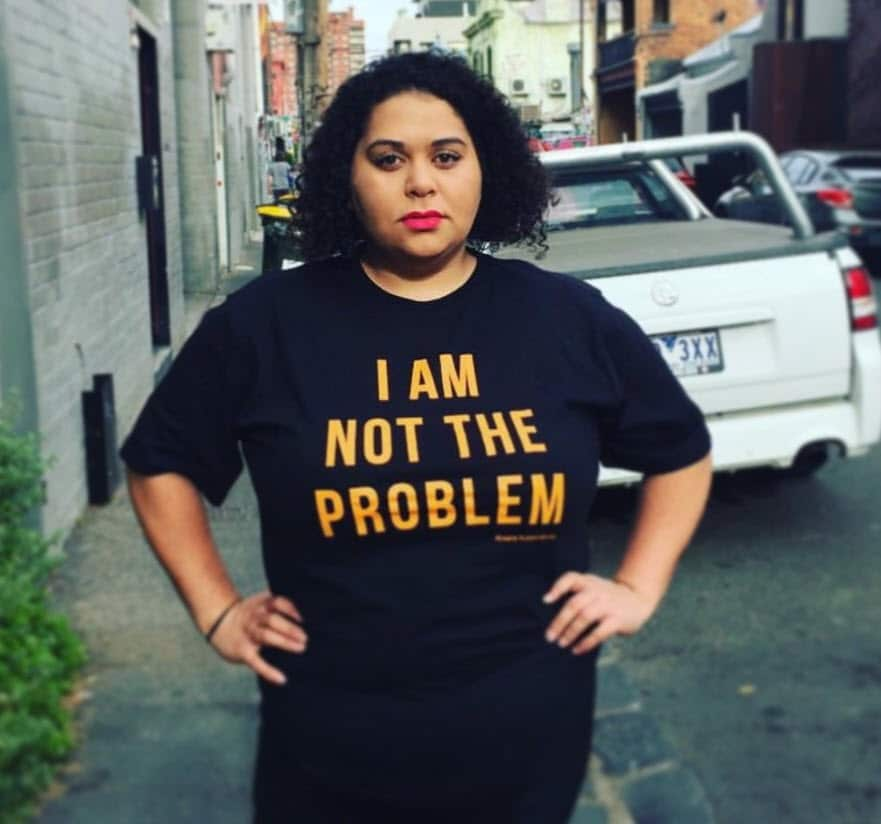
“I had been abused for nearly two weeks by the time Invasion Day came up and I was angry. [But] I can’t be responsible for how people respond to me.”
Ms Onus-Williams says being surrounded by strong women helps her persevere.
"My nan, all the women in WAR, the women in the KYC, there are so many amazing Aboriginal women who I love and inspire me, and I appreciate so much," she says.
The outpouring of support online, with the trending #IStandWithTarneen, confirmed for Ms Onus-Williams that people were in her corner.
"Seeing all my mob come out and support me it just confirms I’m doing the right thing. They’re on board with me, and they’re supportive and definitely does make me want to fight more," she says.
"Obviously we’re in activism for hope — in the hope that something will change."
For Jacinta Price, she hopes the nation can have a healthy debate that doesn't warrant abuse.
"We need to get to a point where we can discuss issues and have different viewpoints and not want to racially vilify each other or threaten violence or really drag each other down in such an abhorrent sort of way," she says.
She maintains that she will not remain silent.
"I have to continue talking about it," she says.
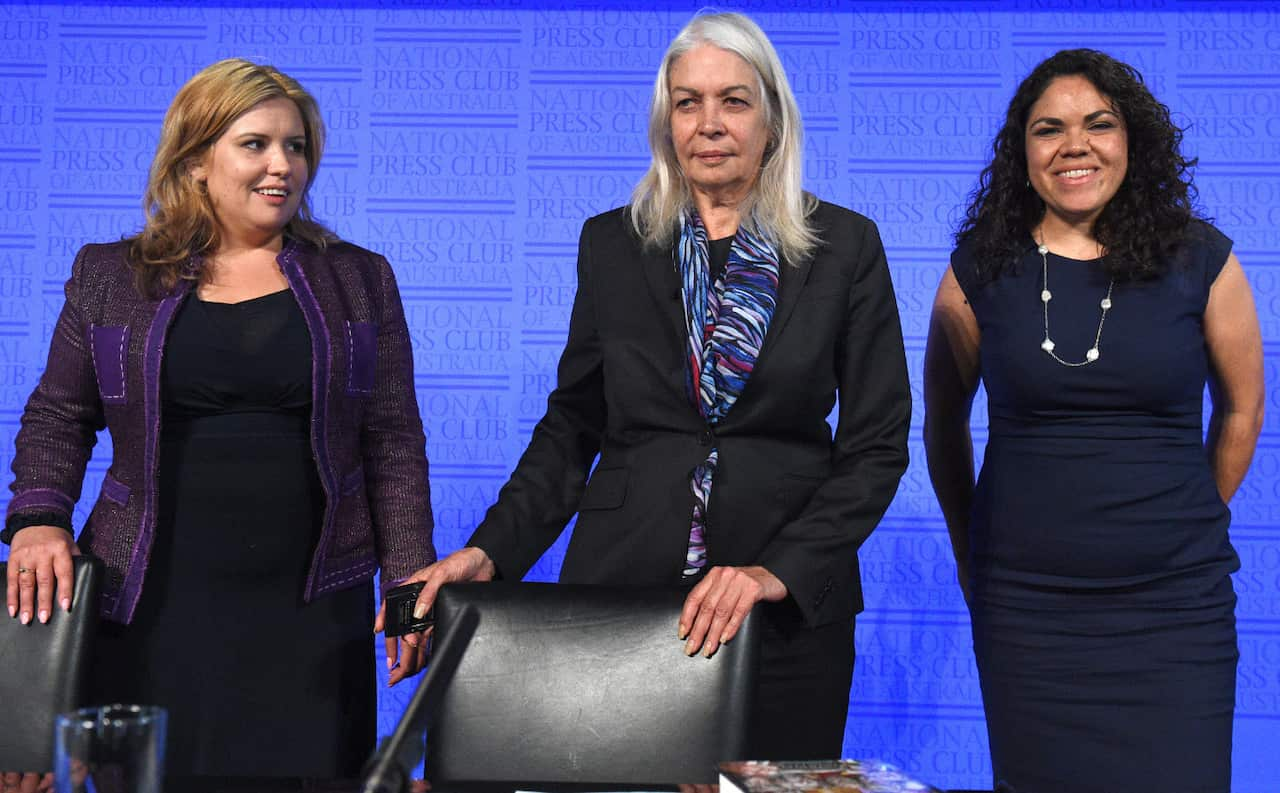
She says women need to start standing together against all forms of abuse.
"As long as I’m alive I will be pushing this particular agenda – an Aboriginal women’s feminist movement. It’s high time I think.”
And Lidia Thorpe says the experience of receiving racist abuse and threats of sexual violence will not deter her.
"It makes me feel more determined," she says.
"This is not going to stop me, this is not going to shut me down."
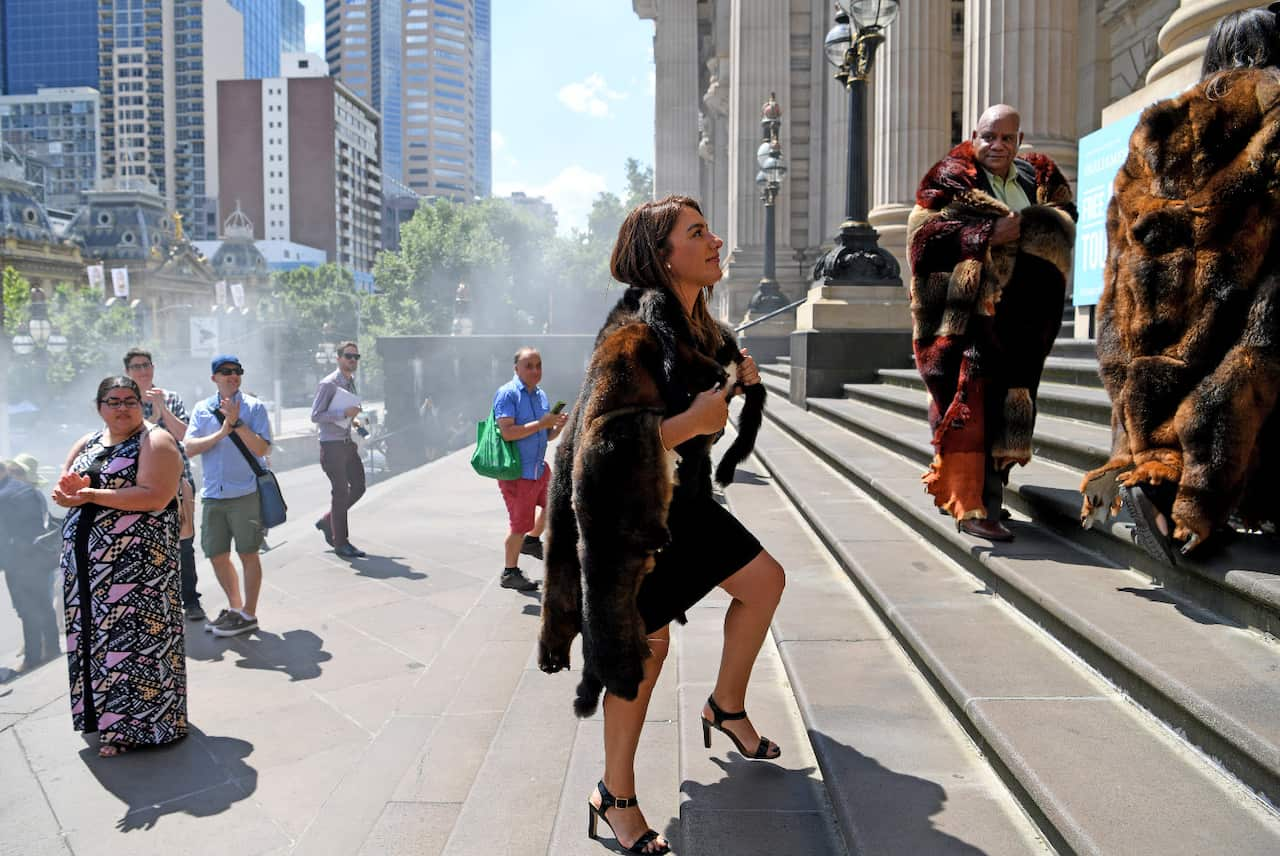
"I want to show these bullies, these criminals if you like, that you can make all the threats you like, it’s not going to shut us down."
She hopes speaking out will grow a movement for all women.
"Because the more we speak out about it, the more we stand up for our rights, the more those minorities are going to feel threatened, so eventually they’ll go away too," she says.
"It not only affects us as women, it affects my children, and it affects my sisters and my mother, and my grandmother, because they don’t want to see me hurt. But at the same time, we will not be shut down by these kinds of people. And I think the more we call it out the better it will be."
Reporter: Nakari Thorpe
Supervising Producer: Claudianna Blanco


